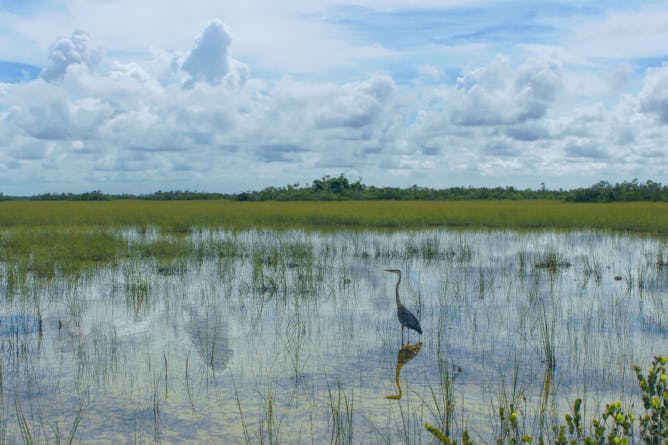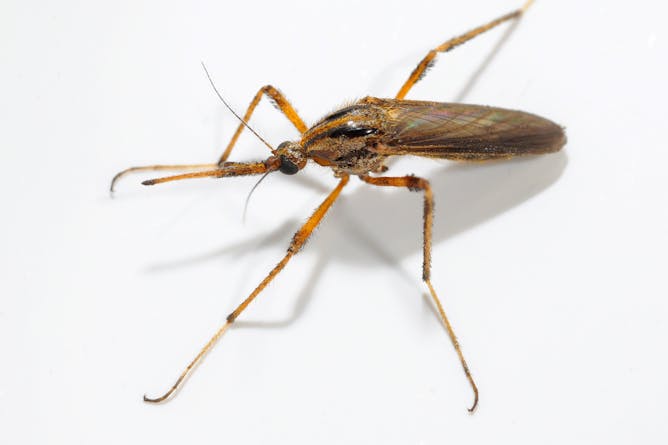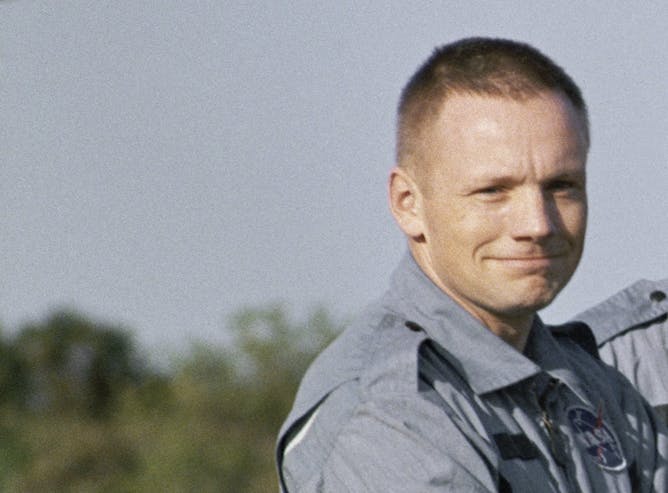|
|
|
Editor's note
|
|
Hurricane Michael battered the Florida Panhandle yesterday, with a storm surge that inundated parts of the coast. Research scientist Siddharth Narayan and research professor Michael Beck of the University of California, Santa Cruz have shown in several studies that protecting wetlands is a highly cost-effective way to reduce flooding risks in coastal areas. Post-storm recovery, they write, should include restoring marshes, mangroves and
other wetlands to buffer coastlines against future hurricanes.
And while probably not their top concern in the immediate aftermath of Hurricane Michael, Floridians may soon notice a surge in giant mosquitoes. North Carolina State University entomologist Michael Reiskind describes the so-called gallinippers his state saw after Hurricane Florence – and why these mega mosquitoes flourish in the floodwaters that remain after big storms.
The upcoming biopic “First Man,” which premieres this weekend, will tell the life story of Neil Armstrong. For many Americans, it’ll be their first glimpse of Armstrong the man: After the Apollo 11 moon landing, he disappeared from the public spotlight, while widespread interest in NASA’s ambitious programs quickly fizzled, too. As University of Richmond English professor Joe Essid explains, those once mesmerized by NASA’s plans for lunar bases and manned flybys of Venus wanted more – so much more – out of Armstrong.
|
Jennifer Weeks
Environment + Energy Editor
|

|
|
Top stories
|

Protecting coastal wetlands, like this slough in Florida’s Everglades National Park, is a cost-effective way to reduce flooding and storm damage.
NPS/C. Rivas
Siddharth Narayan, University of California, Santa Cruz; Michael Beck, University of California, Santa Cruz
Coastal development is destroying marshes, mangroves and other wetlands that provide valuable protection from hurricanes and storms. Research shows these benefits can be worth millions of dollars.
|

An inch-long bloodsucker on the hunt for a meal.
Ben Seese/Flickr
Michael Reiskind, North Carolina State University
Yes, giant mosquitoes are a thing. They're specialized to wait out the dry times only to emerge from their eggs when high water provides the perfect larval environment.
|

Those mesmerized by NASA’s accomplishments and ambitions wanted so much more out of the reticent Armstrong.
AP Photo
Joe Essid, University of Richmond
After the first moon landing, the feelings that propelled a unified national mission quickly dissipated. Could Armstrong have played a bigger role in galvanizing the public for future projects?
|
Politics + Society
|
-
Cavan W. Concannon, University of Southern California
US law says the president can't be indicted, an echo of ancient Roman law. The efforts Roman leader Julius Caesar made to maintain his immunity is a cautionary tale for America's political system.
-
Kevin Wozniak, University of Massachusetts Boston
A new public opinion survey reveals Americans largely agree on sentencing reform, and how money spent on prisons could be reinvested in communities.
|
|
|
|
|
|
|
|
Trending on site
|
-
David Pride, University of California San Diego; Chandrabali Ghose, The Rockefeller University
Just because you don't have the flu doesn't mean that your aren't teeming with viruses inside and out. But what are all these viruses doing, if they aren't making you sick?
-
Daniel R. Weinberger, Johns Hopkins University
Separating children from their parents is not just a psychological stress, it's a DNA stress. Scientific research shows that early life stress may have irreversible effects on how DNA works in the cells of the body.
-
Peter Schumer, Middlebury College
Linguistic clues show how people around the world first developed mathematical thought.
|
|
|
|
| |
| |
|
|
|
|
|
|
|